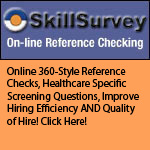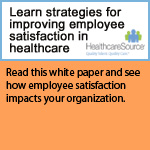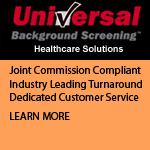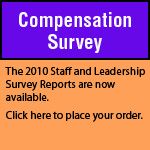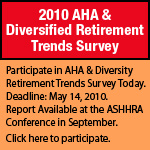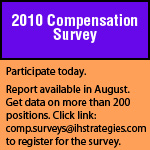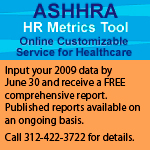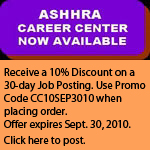ASHHRA eNews Pulse
ASHHRA
May 11, 2010Hello ASHHRA Members,
While driving past highway construction projects, I've occasionally seen signs that say 'Your Tax Dollars at Work!' I realize people react differently to those kinds of signs, but I tend to like them; they remind me that 1) a lot goes on behind the scenes, as it were, to move things forward [highway design, construction planning, etc.], 2) I'm connected inasmuch as I helped fund it and, 3) in the end, collectively I'm part of a much bigger 'thing' than myself that results in concrete (no pun intended) changes.
Your ASHHRA Advocacy Committee travels to Washington, D.C., to collaborate with others in influencing the future direction of our country. Imagine a sign that says 'Your ASHHRA membership dues at work!' I like that, too. The committee reminds me that a lot goes on behind the scenes; your 10-member committee, chaired by Les Abercrombie, has worked hard all year to prepare for this trip. They've arranged for specific meetings with key senators and representatives, Congressional staffers and others. They've discussed and decided which initiatives to focus on and developed position papers that will be distributed. They've been coached on the 'how to' of Congressional visits including crucial follow-up methodology.
The committee helps me realize my membership dues to ASHHRA help fund their trip and that through them I am part of a much larger collective whole, and that we can make a 'concrete' difference.
The committee will be in Washington May 17 and 18 and will focus on ensuring EFCA stays dormant, that the job title 'supervisors' remains solidly a part of management (RESPECT Act) and that local hospitals and their nurses decide on issues like safe patient handling and patient ratios, versus federal government mandates.
The committee also will meet with other advocacy counterparts and allies from the AHA and SHRM as ASHHRA continues a strong collaboration and cooperation on key human resource issues. Wish them well as they work hard representing you and me and our profession. Look for a Webinar later in the year in which they will detail their visit and key legislative issues facing us.
If you are interested in becoming a part of the Advocacy Committee, feel free to reach out to ASHHRA Executive Director Stephanie Drake at sdrake@aha.com.
Jeff Payne, SPHR
Vice President, Human Resources
Lakeland Regional Medical Center
1324 Lakeland Hills Blvd
Lakeland, FL 33805-4500
863-687-1045
863-284-1971 (fax)
Visit http://www.ashhra.org/ashhra/learning/new_to_the_profession.html to view the full article online.
Visit http://www.ashhra.org/ashhra/learning/webinars.html to view the full article online.
Visit http://hr.blr.com/HR-news/HR-Administration/Employment-Laws-Regulations/Possible-Changes-to-DOL-Enforcement-Strategy/ to view the full article online.
Visit http://www.hrmorning.com/just-how-closely-can-you-monitor-employee-communications/ to view the full article online.
As the nation grapples with these challenges, several new occupations are emerging that have the potential to keep people healthier and lower costs. Many of these emerging jobs can be designed to appeal to boomers in search of encore careers, and filling them with older, experienced employees can benefit patient care. This paper examines six such new occupations identified by a panel of national experts in workforce and health care issues.
Visit http://www.naylornetwork.com/ahh-nwl/pdf/JobsHealthPaper.pdf to view the full article online.
Visit http://blogs.hbr.org/hmu/2010/04/make-your-new-hire-immediately.html to view the full article online.
Visit http://www.forbes.com/2010/04/08/risk-compensation-balance-leadership-governance-directorship.html?boxes=leadershipchanneldirectorship to view the full article online.
Visit http://hr.blr.com/HR-news/Staffing-Training/Employee-Manager-Training/Corporate-Training-Trends-to-Watch-for-in-the-Comi/ to view the full article online.
Visit http://blogs.hbr.org/cs/2010/05/the_productivity_myth.html to view the full article online.
Visit http://www.hrmorning.com/changes-coming-to-employer-retirement-plans/ to view the full article online.
Visit http://www.shrm.org/hrdisciplines/benefits/Articles/Pages/DoMore.aspx to view the full article online.
Visit http://news.nurse.com/article/20100507/ALL01/105170003/-1/frontpage to view the full article online.
Visit http://blogs.hbr.org/hmu/2010/04/youve-made-a-mistake-now-what.html to view the full article online.
Visit http://www.businessweek.com/managing/content/may2010/ca2010057_992978.htm to view the full article online.



